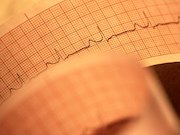Risk up with use of non-selective NSAIDs and combined use of selective, non-selective NSAIDs
FRIDAY, March 23, 2018 (HealthDay News) — Nonsteroidal anti-inflammatory drug (NSAID) use is associated with increased risk of atrial fibrillation (AF) in a middle-aged Asian population, according to a study published online March 20 in the British Journal of Clinical Pharmacy.
Shao-Yuan Chuang, Ph.D., from the National Health Research Institutes in Taiwan, and colleagues conducted a nested case-control study to examine the correlation between NSAID use and the risk of AF in a middle-aged Asian population using the National Health Insurance Research Database (NHIRD) in Taiwan. Cases with a diagnosis of AF were identified and matched with controls from three independent Longitudinal Health Insurance Databases derived from the NHIRD. Data were included from 28,529 cases and 28,529 matched controls.
The researchers found that, compared with non-users, NSAID users had increased AF risk (adjusted odds ratio, 1.18). On examination of the effects of different classes of NSAID on AF risk, participants who used non-selective NSAIDs and those with a combined use of selective and non-selective NSAIDs had a significantly elevated risk of AF (adjusted odds ratios, 1.18 and 1.3, respectively).
“NSAID use was associated with an increased risk of AF occurrence among the participants included in our study cohort,” the authors write. “Closely monitoring the adverse effects of NSAID treatment on the risk of AF will be important, particularly among individuals at high risk.”
Copyright © 2018 HealthDay. All rights reserved.








